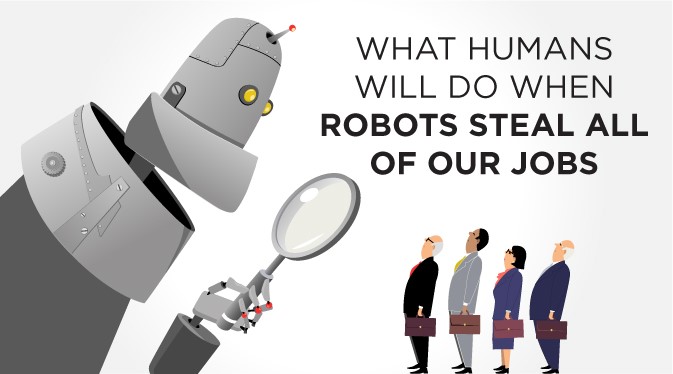What Humans Will Do When Robots Steal All of Our Jobs
Let’s say you’re a buggy maker in 1920. There’s a magic moment when innovation and new technology offer you a choice. You can keep making buggies that don’t sell, or shift your expertise into automotive technology. Are you approaching that tipping point today? Is the trend of technology destroying jobs for humans . . . or is it creating new opportunities for the future? We think the real question is, “How flexible are you?”
The Inherent Danger
What if machines are getting so smart that they no longer need labor to operate? Doomsayers argue that information technology and automation are a central reason why median wages have been stagnant in the U.S. over the past decade, despite rising productivity. Technological progress is also a major factor in the increase of job inequality, because automation is eliminating many jobs that were once done by people. Machines are indeed replacing humans. And while the polarization of the labor market is a real, short-term concern, let’s look at the flip side—what jobs will be created?
Yes, Robots Will Steal Our Jobs, But We Will Get New Ones
Much of this is discussed by author Kevin Kelly in his new book The Inevitable, with the subtitle Understanding the 12 Technological Forces that Will Shape Our Future. It’s incredible what robots can do and what they will be able to do.
Kevin Kelly asserts that automation creates jobs we didn’t know were possible and jobs we didn’t know we wanted.
“Before we invented automobiles, air-conditioning, flat-screen video displays, and animated cartoons, no one living in ancient Rome wished they could watch pictures move while riding to Athens in climate-controlled comfort. . . When robots and automation do our most basic work, making it relatively easy for us to be fed, clothed, and sheltered, then we are free to ask, ‘What are humans for?’”
Industrialization has allowed humans to pursue the arts and sciences as never before. Ironically, automation is one of the reasons we are advancing in technology so quickly. Robots are notoriously precise—they are good at doing the same thing over and over again, so where do humans fit in? By doing everything that is gloriously inefficient, like creating relationships, implementing creativity, and fostering human contact—the things that make us human. Even if a robot can perform a functional interaction verbally, emotional relationships with robots are only possible in fiction—and they usually don’t turn out too well. There’s no foreseeable replacement for deciphering nuance, showing empathy, and thinking outside of the box.
Machines have offered us fantastic abundance and there’s no reason to believe it will not continue to be this way. Concerns that the jobs that go away will not be replaced by new opportunities are overblown and we are not currently headed toward a rise of the machines. Humans will always be necessary, even if we can’t predict what they will be doing. The key is for humans to adapt to their environment, and we are very good at that. It’s a time to roll up our sleeves and prepare. That means education, training, and possibly relocating for some of America’s work force. It’s not time to pit man versus machine just yet. It’s time to evaluate how you personally contribute to today’s economy. Here’s what you can do:
- • Assess your industry and how it will be affected and the challenges you face.
- • Discover how you fit into changes and how they will affect you.
- • Acquire an attitude of lifelong learning and education to stay relevant.
- • Take responsibility for your contribution to society and the economy.
- • Create alternate ways of growing wealth.
Your Future is Secured
Creating an income strategy for the technological revolution has other facets aside from work skills. You can create a financial strategy that not only allows you to adapt to the workplace, but allows you to take advantage of the luxuries technology brings to our lives. We call it the Perpetual Wealth Strategy and it’s powered by a carefully structured whole life insurance policy with a cash addition.
When you have the knowledge to leverage the advantages of whole (or permanent) life insurance, you create your own bank. You can watch your money grow and borrow from yourself while you safely adjust to today’s economy while enjoying the liberation that technology offers.

When evaluating your wealth strategy, remember that the technology revolution can add to the chaos of unstable investments. We always recommend building your financial strategy around a stable environment and outside of Wall Street. Let us show you how. We are excited to invite you to take 2 minutes to sign up for a FREE, extensive eCourse called Infinite 101®. You’ll receive access to video tutorials, articles, and podcasts. It literally costs you nothing to become educated on this ideal financial strategy and start changing your wealth paradigm!
Take advantage of this FREE resource by clicking below.
 Reference: https://mises.org/library/good-news-theyre-not-telling-you
Reference: https://mises.org/library/good-news-theyre-not-telling-you







